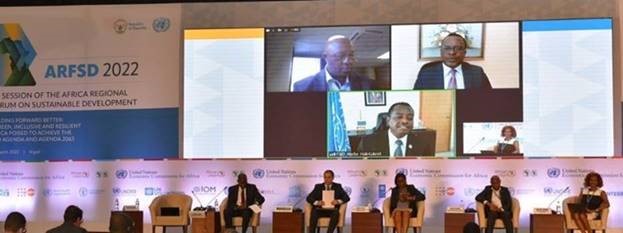Enhancing investments, scaling up resource mobilization and adopting a multisectoral approach by governments and the private sector are crucial to combating land degradation and improving productivity and sustainability of land, forests and biodiversity resources for inclusive green growth. This was amongst the key messages that came out of the African Sustainable Development Forum (ARFSD 2022) parallel session on the sub-theme of Life on land (SDG 15).
The parallel session, co-organized by the United Nations Economic Commission for Africa (UNECA), the Food and Agriculture Organization of the United Nations (FAO), and the United Nations Environment Programme (UNEP), sought to review progress made by member states and exchange experiences, discuss challenges and proposed directions on accelerating actions towards meeting the SDG15 targets. The session was held on March 4 2022, in Kigali Rwanda, along with four parallel sessions on other sustainable development goals prioritized to be reviewed in the forum this year.
Co-chairing the panel discussion, FAO Assistant Director-General and Regional Representative for Africa, Abebe Haile Gabriel emphasized vital roles of research and innovation, and enforcing regulatory frameworks in ecosystems conservation in Africa. Appreciating countries’ good practices in sustainable use and management of natural resources, He added “strengthening the valuation of natural capital and the mainstreaming of biodiversity, climate-friendly agriculture, and disaster risk reduction in voluntary national development plans and budgets is crucial.”
In her remarks, Minister for Agriculture of the Republic of Niger, Garama Saratou Rabiou, shared her country’s experiences and good practices. She mentioned that there is a high level of land degradation due to climate change and mounting pressure on natural resources because of the need to feed the growing population. Inadequate budgetary resources impede efforts to address challenges.
High-level representatives from the Republic of Liberia and the Kingdom of Morocco also shared their unique country experiences on what has worked well and proposed directions. The session also heard from panellists representing youth, the environment, and the private sector who emphasized the need for empowering women, youth, indigenous people and local communities. They noted the importance of enforcing resource tenure rights and access to finance to achieve inclusive wealth creation and sustainable management of forest and biodiversity resources.
The session concluded that the SDG on Life on Land, including forest, biodiversity and other land resources is crucial to achieving most of the Sustainable Development Goals and fostering a transformation towards a green, inclusive and resilient Africa. It warned that social-economic development should not be attained at the expense of the environment.
Road map to accelerating efforts to meet the SDG15 targets
The loss of biodiversity-dependent ecosystem services has a disproportionate effect on vulnerable populations. Close to two per cent of the continent’s surface is degraded due to unsustainable agriculture and climate change. Globally, it is estimated that 1.2 billion jobs directly depend on healthy and stable nature; and ecosystem services are estimated to constitute between 50 and 90 per cent of the total source of livelihoods among poor rural and forest-dwelling households. Ecosystem degradation erodes the resilience of communities and nations and exposes them to increased risks and impacts from disasters.
Given the importance of natural land resources, it is important to accelerate actions to sustainably manage forests, combat desertification, and halt and reverse land degradation and biodiversity loss. To this effect, the parallel session adopted key messages to accelerate efforts to meet SDG 15. It is essential to strengthen and scale up the valuation of natural capital and to mainstream biodiversity, and seek nature-based solutions, and climate-friendly agriculture and disaster risk reduction in voluntary national reviews and development plans and budgets.
There is a need to increase investments and resource mobilization to enhance productivity efforts for sustainable management of land. Strengthening national One Health approaches and deepening partnerships and coordination for effective implementation are key to implementing policies, plans and frameworks.
Turning commitments in to action
The SDG15 parallel session urged actors to translate commitments into Action in reducing disaster risk and build resilience through biodiversity conservation and nature-based solutions. Empowering disadvantaged social sectors, improving research and innovation, and integrating environmental data and statistics in national statistical systems are pivotal steps to building inclusive and sustainable green economy.
The parallel session on SDG 15 was one of the five parallel sessions prioritized by the ARFSD 2022, which was this year organized under the theme “Building back better from the coronavirus disease (COVID-19) while advancing the full implementation of the 2030 Agenda for Sustainable Development.








